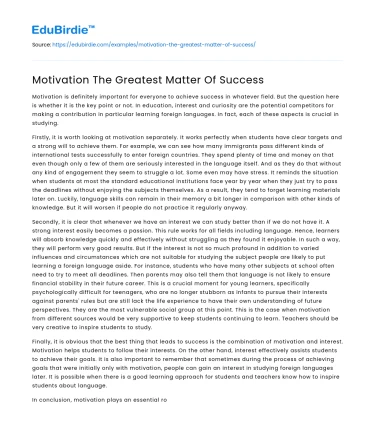Motivation is definitely important for everyone to achieve success in whatever field. But the question here is whether it is the key point or not. In education, interest and curiosity are the potential competitors for making a contribution in particular learning foreign languages. In fact, each of these aspects is crucial in studying.
Firstly, it is worth looking at motivation separately. It works perfectly when students have clear targets and a strong will to achieve them. For example, we can see how many immigrants pass different kinds of international tests successfully to enter foreign countries. They spend plenty of time and money on that even though only a few of them are seriously interested in the language itself. And as they do that without any kind of engagement they seem to struggle a lot. Some even may have stress. It reminds the situation when students at most the standard educational institutions face year by year when they just try to pass the deadlines without enjoying the subjects themselves. As a result, they tend to forget learning materials later on. Luckily, language skills can remain in their memory a bit longer in comparison with other kinds of knowledge. But it will worsen if people do not practice it regularly anyway.
Secondly, it is clear that whenever we have an interest we can study better than if we do not have it. A strong interest easily becomes a passion. This rule works for all fields including language. Hence, learners will absorb knowledge quickly and effectively without struggling as they found it enjoyable. In such a way, they will perform very good results. But if the interest is not so much profound in addition to varied influences and circumstances which are not suitable for studying the subject people are likely to put learning a foreign language aside. For instance, students who have many other subjects at school often need to try to meet all deadlines. Then parents may also tell them that language is not likely to ensure financial stability in their future career. This is a crucial moment for young learners, specifically psychologically difficult for teenagers, who are no longer stubborn as infants to pursue their interests against parents' rules but are still lack the life experience to have their own understanding of future perspectives. They are the most vulnerable social group at this point. This is the case when motivation from different sources would be very supportive to keep students continuing to learn. Teachers should be very creative to inspire students to study.
Finally, it is obvious that the best thing that leads to success is the combination of motivation and interest. Motivation helps students to follow their interests. On the other hand, interest effectively assists students to achieve their goals. It is also important to remember that sometimes during the process of achieving goals that were initially only with motivation, people can gain an interest in studying foreign languages later. It is possible when there is a good learning approach for students and teachers know how to inspire students about language.
In conclusion, motivation plays an essential role for students to learn languages. The same is about interest unless the interest becomes a serious passion. But each of these aspects alone hardly can help students to have a just-satisfied result. Vice versa, the combination of them is what can bring students to a blooming success in studying foreign languages.






 Stuck on your essay?
Stuck on your essay?

